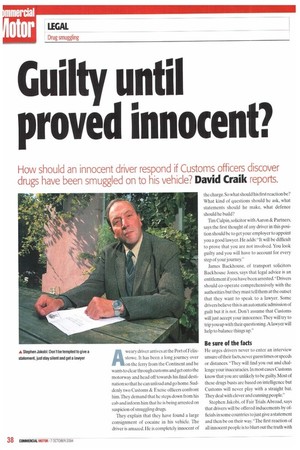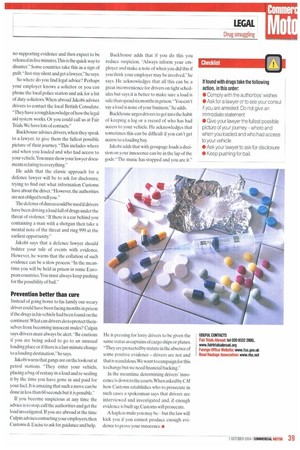Guilty unti proved innocent?
Page 38

Page 39

If you've noticed an error in this article please click here to report it so we can fix it.
How should an innocent driver respond if Customs officers discover drugs have been smuggled on to his vehicle? David Craik reports.
Aweary driver arrives at the Port of Felixstowe. It has been a long journey over on the ferry from the Continent and he wants to clear through customs and get onto the motorway and head off towards his final destination so that he can unload and go home. Suddenly two Customs & Excise officers confront him. They demand that he steps down from his cab and inform him that he is being arrested on suspicion of smuggling drugs.
They explain that they have found a large consignment of cocaine in his vehicle. The driver is amazed. He is completely innocent of the charge. So what should his first reaction be? What kind of questions should he ask, what statements should he make, what defence should he build?
Tim Culpin, solicitor with Aaron & Partners, says the first thought of any driver in this position should be to get your employer to appoint you a good lawyer. He adds: "It will be difficult to prove that you are not involved. You look guilty and you will have to account for every step of your journey."
James Backhouse, of transport solicitors Backhouse Jones, says that legal advice is an entitlement if you have been arrested. "Drivers should co-operate comprehensively with the authorities but they must tell them at the outset that they want to speak to a lawyer. Some drivers believe this is an automatic admission of guilt but it is not. Don't assume that Customs will just accept your innocence. They will try to trip you up with their questioning. A lawyer will help to balance things up."
Be sure of the facts
He urges drivers never to enter an interview unsure of their facts,never guess times or speeds or distances. "They will find you out and challenge your inaccuracies. In most cases Customs know that you are unlikely to be guilty. Most of these drugs busts are based on intelligence but Customs will never play with a straight bat. They deal with clever and cunning people."
Stephen Jakobi, of Fair Trials Abroad, says that drivers will be offered inducements by officials in some countries to just give a statement and then be on their way. "The first reaction of all innocent people is to blurt out the truth with no supporting evidence and then expect to be released in live minutes.This is the quick way to disaster." Some countries take this as a sign of guilt. "Just stay silent and get a lawyer," he says.
So where do you find legal advice? Perhaps your employer knows a solicitor or you can phone the local police station and ask for a list of duty solicitors. When abroad Jakobi advises drivers to contact the local British Consulate. "They have a rough knowledge of how the legal aid system works. Or you could call us at Fair Trials. We have lots of contacts."
Backhouse advises drivers, when they speak to a lawyer. to give them the fullest possible picture of their journey. "This includes where and when you loaded and who had access to your vehicle.You must show your lawyer documents relating to everything."
He adds that the classic approach for a defence lawyer will be to ask for disclosure, trying to find out what information Customs have about the driver. "However, the authorities are not obliged to tell you."
The defence of duress could be used if drivers have been driving a load full of drugs under the threat of violence. "If there is a car behind you containing a man with a shotgun then take a mental note of the threat and ring 999 at the earliest opportunity."
Jakobi says that a defence lawyer should bolster your tale of events with evidence. However, he warns that the collation of such evidence can be a slow process. "In the meantime you will be held in prison in some European countries.You must always keep pushing for the possibility of bail."
Prevention better than cure
Instead of going home to his family our weary driver could have been facing months in prison if the drugs in his vehicle had been found on the continent. What can drivers do to protect themselves from becoming innocent mules? Culpin says drivers must always be alert. "Be cautious if you are being asked to go to an unusual loading place or if there is a last-minute change to a loading destination," he says.
Jakobi warns that gangs are on the lookout at petrol stations. "They enter your vehicle, placing a bag of ecstasy in a load and re-sealing it by the time you have gone in and paid for your fuel. It is amazing that such a move can be done in less than 60 seconds but it is possible."
If you become suspicious at any time the advice is to stop, call the authorities and get the load investigated. if you are abroad at the time Culpin advises contacting your employers, then Customs & Excise to ask for guidance and help. Backhouse adds that if you do this you reduce suspicion. "Always inform your employer and make a note of when you did this if you think your employer may be involved," he says. He acknowledges that all this can be a great inconvenience for drivers on tight schedules but says it is better to make sure a load is safe than spend six months in prison."You can't say a load is none of your business." he adds.
Backhouse urges drivers to get into the habit of keeping a log or a record of who has had access to your vehicle. He acknowledges that sometimes this can be difficult if you can't get access to a loading bay.
Jakobi adds that with groupage loads a decision on your innocence can be in the lap of the gods: "The music has stopped and you are it."
He is pressing for lorry drivers to be given the same status as captains of cargo ships or planes. "They are protected by statute in the absence of some positive evidence — drivers are not and that is scandalous,We want to campaign for this to change but we need financial backing."
In the meantime determining drivers' innocence is down to the courts.When asked by CM how Customs establishes who to prosecute in such cases a spokesman says that drivers are interviewed and investigated and, if enough evidence is built up, Customs will prosecute.
A hapless mule you may he —but the law will kick you if you cannot produce enough evidence to prove your in nocence.•






























































































































































































